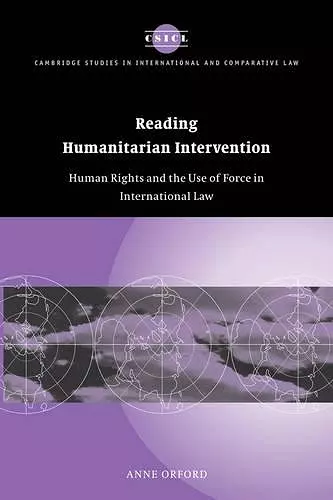Reading Humanitarian Intervention
Human Rights and the Use of Force in International Law
Format:Hardback
Publisher:Cambridge University Press
Published:26th Jun '03
Currently unavailable, and unfortunately no date known when it will be back
This hardback is available in another edition too:
- Paperback£44.99(9780521047661)

Uses legal, feminist and postcolonial, and psychoanalytic theory to consider the cultural and economic effects of militarized humanitarianism.
During the 1990s, humanitarian intervention seemed to promise a world in which human rights would be privileged over national interests or imperial ambitions. Orford argues that humanitarian intervention had far more exploitative effects. What, if anything, has been lost in the move from humanitarian intervention to the war on terror?During the 1990s, humanitarian intervention seemed to promise a world in which democracy, self-determination and human rights would be privileged over national interests or imperial ambitions. Orford provides critical readings of the narratives that accompanied such interventions and shaped legal justifications for the use of force by the international community. Through a close reading of legal texts and institutional practice, she argues that a far more circumscribed, exploitative and conservative interpretation of the ends of intervention was adopted during this period. The book draws on a wide range of sources, including critical legal theory, feminist and postcolonial theory, psychoanalytic theory and critical geography, to develop ways of reading directed at thinking through the cultural and economic effects of militarized humanitarianism. The book concludes by asking what, if anything, has been lost in the move from the era of humanitarian intervention to an international relations dominated by wars on terror.
' … one of the many compelling aspects of Orford's book is her ability to generalise the central insistence of how a question, or set of choices, becomes framed in the international context … the pertinence to the discipline as a whole of understanding how a question comes to be asked is one of the reasons why Orford's book will deservedly have a committed readership well beyond scholars of international humanitarian law … Reading Humanitarian Intervention usefully teases out the relationship between law and power … situating Orford's work within a broader body of critical international law scholarship … timely and powerful.' Melbourne University Law Review
'… a useful contribution to the debate.' Journal of Peace Research
'Dealing with themes that have been a magnet for an array of pieties by moralists and legalists in recent years. Anne Orford challenges conventional wisdom in a provocative and persuasive manner. She brings an intelligent and informed skepticism to claims by governments and international institutions that their use of force in the pursuit of humane ends is beneficial for the peoples that are supposedly being protected from adversity … It deserves the widest possible reading, and is a fine complement to the more conventional book[s].' Richard Falk, Political Science Quarterly
'… the book has a broader appeal than just to lawyers …' Common Law World Review
'… an innovative, provocative, and challenging text on international law, a very rare accomplishment indeed [which offers] a theoretically rich, yet engaging analysis of the debates in international law and politics on humanitarian intervention …' Doris Buss, Social and Legal Studies
'… eloquent and challenging …' Dino Kritsiotis, Modern Law Review
'Orford presents a compelling challenge to those who argue for militarist interventions to protect victimized peoples.' Perspectives on Political Science
'… a fascinating and quite provocative reading of humanitarian intervention … powerful and convincing … a success and a milestone that should be seriously considered by all who are interested in human rights …' Ruth Gordon, George Washington International Law Review
'… [a] compelling and brilliantly constructed argument … a vital source for those keen to better understand humanitarian intervention.' Aidan Hehir, International Affairs
'… assists us by providing a theoretical structure in which the relevant issues can be understood and a series of case studies of how things have gone wrong in the past. While [the author] has not made future decisions any easier, her book may contribute to making them better …' Chris Sidoti, NSW Law Society Journal
ISBN: 9780521804646
Dimensions: 236mm x 162mm x 22mm
Weight: 560g
260 pages